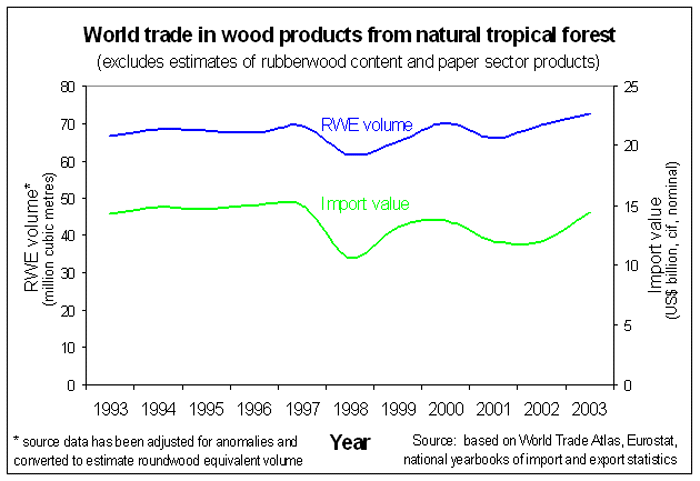|
|
||
|
|
||
|
ITTO |
||
|
|
||
|
The ITTO's membership is confined to governments and includes the governments of several countries which produce and export tropical timber, a number of countries which import, process and then consume or export tropical timber (such as China), and most other major countries which import tropical timber. Equatorial Guinea and the Solomon Islands, which together export a roundwood equivalent volume well in excess of one million m3 each year, are not members. Hong Kong and Taiwan are also not members, despite importing an RWE volume of tropical timber of approximately 5 million cubic metres during 2004. Although ITTO members agreed to take steps to ensure that, by 2000, tropical timber exports would derive from sustainably managed forest, the quantity of such exports has remained almost zero. Further, a high proportion of the tropical timber which is exported or imported by the ITTO's member countries is illegal. Trade in tropical timber, both direct and indirect has, on average, varied for the last ten or so years around an average roundwood equivalent ("RWE") volume of some 70 million cubic metres and a nominal cif import value of US$14 billion. Despite its structure being somewhat akin to that of a trade assocation and irrespective of any rhetoric from its leadership or sponsors, the ITTO appears to have little impact either on the management of natural tropical forest or on trade in tropical timber. This is largely inevitable given that the ITTO has little power over its members - governments. Further, many of its members, whether exporters or importers, have a reputation for political corruption. This lack of power is compounded particularly by the low level of de facto commitment by "the international community" (despite the express wishes of civil society - including many in the industry) to address unsustainable forest management and trade in illegal timber. A consequence is a strategic vacuum which handicaps much of the work which the ITTO commissions or carries out in respect of sustainable forest management and trade. |
||
|
Copyright
globaltimber.org.uk
|

